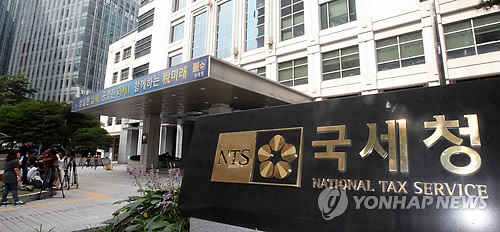- California Assembly OKs highest minimum wage in nation
- S. Korea unveils first graphic cigarette warnings
- US joins with South Korea, Japan in bid to deter North Korea
- LPGA golfer Chun In-gee finally back in action
- S. Korea won’t be top seed in final World Cup qualification round
- US men’s soccer misses 2nd straight Olympics
- US back on track in qualifying with 4-0 win over Guatemala
- High-intensity workout injuries spawn cottage industry
- CDC expands range of Zika mosquitoes into parts of Northeast
- Who knew? ‘The Walking Dead’ is helping families connect
Tax office will review Koreans’ U.S. accounts
By Yoon Ja-young
The National Tax Service (NTS) of Korea will have access to information on the U.S. bank accounts of Koreans from September next year.
The Korea Customs Service will also trace people spending more than $5,000 per quarter on credit cards overseas.
These are part of the country’s effort to crackdown on tax evasion overseas.
The Ministry of Strategy and Finance said Thursday that the country is in the final stages of talks with the United States to sign a Foreign Account Tax Compliance Act agreement.
The U.S. act requires financial institutions in other countries to provide information about American clients having accounts containing more than $50,000. If Korea accepts the deal, it will also get information about Koreans with U.S. bank accounts.
“The United States has already signed the deal with some OECD countries, including the United Kingdom, France and Germany. We are in the final stages of reaching an agreement,” a ministry official said.
He added that this is expected to be signed in July, and the two countries are likely to exchange information annually from September next year.
Both countries are vying to track offshore tax evasion by citizens who are hiding financial assets in foreign bank accounts.
Currently, Seoul requires Koreans to voluntarily report their bank accounts overseas exceeding 1 billion won, but it is difficult for the tax agency to find out who was evading this obligation.
The number of those who voluntarily reported the accounts stood at 678, with the amount totaling 22.8 trillion won in 2013, but it is estimated that there are many people who are not properly reporting.
Even in the case of suspected tax evasion, the NTS had to go through a complicated process to seek information from financial institutions in the other countries.
According to local banks, Koreans who have U.S. citizenship or residency are inquiring about the measure, as many of them have not reported their accounts in Korea to the Internal Revenue Service.
Some of them are considering dividing the money into numerous bank accounts so that each will not exceed $50,000.
With a tight budget, the administration has been focusing on plugging loopholes in taxation. The NTS levied 1.08 trillion won in fines for overseas tax evasion last year.
The Korea Customs Service is also scheduled to get information from the Credit Finance Association on quarterly overseas credit card spending. It aims at cracking down on customs tax evasion by Korean tourists who buy luxury goods at duty free shops and other shopping facilities abroad.













